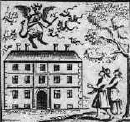
The Ghostly Drummer of Tedworth was a case of suspected poltergeist activity. In the early 1660s John Mompesson of Wiltshire began to hear strange noises in his home. There was the sound of a drum beating, as well as scratching and panting noises. Objects seemed to move of their own accord in the house, and sometimes a strange sulphureous smell lingered in the air.
Mompesson believed that a man he had helped send to jail, a drummer named William Drury, had, through some form of witchcraft, caused a malevolent spirit to invade his home. The case attracted interest throughout England, and many people came to witness the spirit for themselves. However, when the King sent two representatives to investigate the haunting, they found no evidence of supernatural activity.
Skeptics, of which there were many, dismissed the entire thing as a hoax. They suggested that Mompesson himself may have been behind it, either to profit from those who came to see the spirit, or to decrease the value of the house (which was rented). Another possible culprit was Mompesson's servants, who seemed quite pleased at the travails of their master, and who often taunted him by pointing out that he could never fire them because no one else would agree to work for him under such conditions.

 The Ghostly Drummer of Tedworth was a case of suspected poltergeist activity. In the early 1660s John Mompesson of Wiltshire began to hear strange noises in his home. There was the sound of a drum beating, as well as scratching and panting noises. Objects seemed to move of their own accord in the house, and sometimes a strange sulphureous smell lingered in the air.
The Ghostly Drummer of Tedworth was a case of suspected poltergeist activity. In the early 1660s John Mompesson of Wiltshire began to hear strange noises in his home. There was the sound of a drum beating, as well as scratching and panting noises. Objects seemed to move of their own accord in the house, and sometimes a strange sulphureous smell lingered in the air.
Comments
In my account I lay out a number of reasons to suspect why the first Tedworth Drummer could be a hoax. Let me quote from the article:
"First of all, no one was ever allowed to inspect his cellar. Why not? Was someone hiding down there creating all the sounds and commotion? Second of all, the drumming almost always happened at night and seemed to come from outside the house, not inside of it. In other words, someone could easily have been hiding outside banging on the walls of the house with a hammer. Finally, the King himself sent some gentlemen to investigate the haunting, but when they arrived they found no evidence of spectral activity at all."
Personally I think this is enough to label the event a 'probable hoax'. My view is that if a 'haunting' can easily be attributed to human agency, then it should be. There's no reason to invoke ghosts if a phenomenon could easily have been performed by mischievous humans.